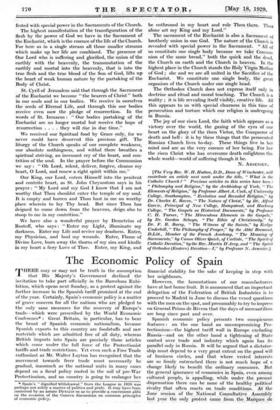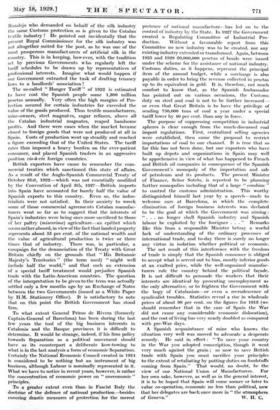The Economic Policy of Spain
HERE may or may not be truth in the assumption that His Majesty's Government declined the invitation to take part officially in the Barcelona Exhi- bition, which opens next Sunday, as a protest against the further increase in the Spanish tariff promised at the end of the year. Certainly, Spain's economic policy is a matter of 'grave concern for all the nations Who are pledged to -the Only sane measures for the recovery of Europe's trade-z--which were prescribed by the World Economic Conference* : Great Britain, in particular, has to bear the brunt of Spanish economic nationalism, because Spanish exports to this country are foodstuffs and raw materials which are admitted free of all duty, whereas British imports into Spain are precisely those -articles which come under the full force of the Protectionist tariffs and trade restrictions. Yet even such a Free Trade enthusiast as' Mr. Walter Layton has recognized that the movement towards freer trade must necessarily be gradual, inasniuch as the national -Units in many cases depend on a fiscal policy rooted in the soil of pre-War Protectionism, and no country is going to endanger her
* Spain's" dignified withdrawal" from the League in 1926 was perhaps not solely a matter Of politics and pride. It may have been contrived by an astute Dictr:or so as to provide a convenient alibi on the occasion of the Geneva discussions on common principles of economic policy.
financial stability for the sake of keeping in step with her neighbours.
However, the lamentations of our manufacturers have at last borne fruit. It is announced that an important delegation. of the Federation of British Industries is to proceed to Madrid in June to discuss the vexed _questions with the men on the spot, and presumably to try to impress on General Primo de Rivera that the days of mercantilism are long since past and over.
Spanish . economic policy, presents two conspicuous features : on the one hand an uncompromising Pro- tectionism—the highest tariff wall in Europe excluding Russia—and on the other hand a tightening of State control over trade and -industry which again has its Parallel only in Russia. It will be argued that a dictator- ship must depend to a very great extent on the good will of business circles, and tlat where vested interests are so firmly. entrenched there is not much hope of a change likely to benefit the, ordinary consumer. But the general ignorance of economics in Spain, even among cultured 'people, is appalling, while Under_ the present dispensation there can be none of 'the healthy, political rivalry that often reacts on trade conditions. At the 'Tune session of the National Consultative Assembly last' year theonly protest Came. from the Marques- de _ _ _ Rozalejo who demanded on behalf of the silk industry the same Customs protection as is given to the Catalan textile industry ! He pointed out incidentally that the present Royal Commissioner for the silk industry was not altogether suited for the post, as he was one of the most prosperous manufacturers of artificial silk in the country. This is in keeping, however, with the tradition set by previous Governments who regularly left the tariff schedules to be -drawn up by representatives of professional interests. Imagine what would happen if our Government entrusted the task of drafting tenancy laws to a landlords' association !
The so-called "Hunger Tariff '" of 1922 is estimated to have cost the Spanish people some 1,800 million pesetas annually Very often the high margins of Pro- tection secured for certain industries far exceeded the value of the goods produced. Thus textile manufacturers, mine-owners, steel magnates, sugar refiners, above all the Catalan industrial magnates, reaped handsome profits. And there were cases when the market became closed to foreign goods that were not produced at all in Spain. Costs of production went up steadily and reached a figure exceeding that of the United States. The tariff rates thus imposed a heavy burden on the ever-patient consumer, and placed Spanish traders in an aggressive position vis-a-vis foreign countries.
British exporters have cause to remember the com- mercial treaties which sanctioned this state of affairs.
As a result of the Anglo-Spanish Commercial Treaty of October 81st, 1922—which was not essentially modified by the Convention of April 5th, 1927—British imports into Spain have accounted for barely half the value of Spanish exports to this country. Even so, the indus- trialists were not satisfied. In their anxiety to wreck • some of those commercial agreements Catalan manufac- turers went so far as to suggest that the interests of Spain's industries were being once more sacrificed to those of her paltry (miserritna) agriculture—an epithet which seems rather absurd, in view of the fact that landed property represents about 55 per cent. of the national wealth and the value of agricultural production is twice or three times that of industry. There was, in particular, a campaign for the denunciation of the Treaty with Great Britain chiefly on the grounds that "His Britannic Majesty's Territories" (the -term used) "might well include half the world," and that such an extension of a special tariff treatment would prejudice Spanish trade with the Latin-American countries. The question of the interpretation to be given to the term was actually settled only a few months ago by an Exchange of Notes between the two Governments (issued as a White Paper by H.M. Stationery Office). It is satisfactory to note that on this point the British Government has stood arm.
To what extent General Primo de Rivera (formerly Captain-General of Barcelona) has been during the last few years the tool of the big business interests in Catalonia and the Basque provinces it is difficult to determine. It would be strange, indeed, if his firm policy towards Separatism as a political movement should have as its counterpart a deliberate kow-towing to what is in the last analysis a form of economic Separatism.
Certainly the National Economic Council created in 1924 is considered to be nothing but an instrument of big business, although Labour is nominally represented in it.
What we have to notice in recent years, however, is rather the concentration of economic power on " uneconomic " principles.
To a greater extent even than in Fascist Italy the doctrine of the defence of national production—besides ensuring drastic measures of protection for the merest pretence of national manufacture—has led on to the control of industry by the State. In 1927 the Government created a Regulating Committee of Industrial Pro- duction. Without a favourable report from this Committee no new industry was to be created, nor any existing industry extended or transformed. Again, between 1925 and 1928 30,000,000 pesetas of bonds were issued under the scheme for the assistance of national industry. Customs duties, as it happens, represent the principal item of the annual budget, while a surcharge is also payable in order to bring the revenue collected in pesetas up to its equivalent in gold. It is, therefore, not much comfort to know that, as the Spanish Ambassador has pointed out on various occasions, the Customs duty on steel and coal is not to be further increased— or even that Great Britain is to have the privilege of sending 750,000 tons of coal a year under a special tariff lower by 40 per cent. than any in force.
The purpose of suppressing competition in industrial spheres is clear enough from the much-discussed coal import regulations. First, centralized selling agencies were established, then came the proposal to restrict importations of coal to one channel. It is true that so far this has not been done, but our exporters who have built up depots and organizations in Spain may well be apprehensive in view of what has happened to French and British oil companies in consequence of the Spanish Government's monopoly of the importation and sale of petroleum and its products. The present Minister of Finance, Senor Sotelo, is reported to be planning further monopolies including that of a large " combine " to control the customs administration. This worthy distinguished himself last year by a speech—made to welcome ears at Barcelona, in which the complete elimination of foreign business interests was declared to be the goal at which the Government was aiming : " . . no longer shall Spanish industry and Spanish labour be exploited by the foreigner . . " Remarks like this from a responsible Minister betray a woeful lack of understanding of the ordinary processes of international trade, and to-day there is surely no longer any virtue in isolation whether political or economic.
The net result of this interference with the freedom of trade is simply that the Spanish consumer is obliged to accept what is served out to him, mostly inferior goods at an exalted price, while the well-organized manufac- turers rule the country behind the political façade. It is not difficult to persuade the workers that their interests are identical by presenting unemployment as the only alternative, or to frighten the Government with the bogy of Catalanism—or even a recrudescence of syndicalist troubles. Statistics reveal a rise in wholesale prices of about 90 per cent. on the figures for 1918 (we should remember that in the case of Spain the War did not cause any considerable economic dislocation), and the cost of living has very nearly doubled as compared with pre-War days.
A Spanish acquaintance of mine who knows the situation very well was moved to advocate a desperate remedy. He said in effect : "To save your country in the War you adopted conscription, though it went very much against the grain ; so now to save British trade with Spain you must sacrifice your principles to the extent of retaliating by putting duties on foodstuffs coming from Spain." That would, no doubt, be the view of our National Union of Manufacturers. For her own sake, however, as well as in the general interest, it is to be hoped that Spain will come sooner or later to value co-operation, economic no less than political, now that her delegates are back once more in " the atmosphere of Geneva." W. H. C,













































 Previous page
Previous page